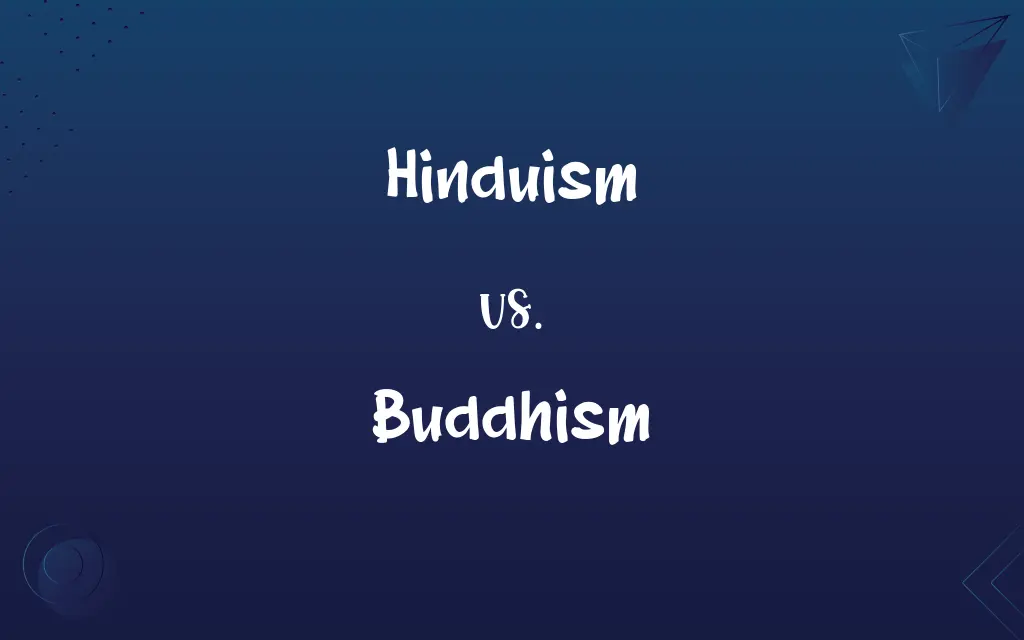Hinduism vs. Buddhism: Know the Difference

By Shumaila Saeed || Updated on December 25, 2023
Hinduism is a polytheistic religion with a belief in reincarnation and karma, whereas Buddhism is a path of practice and spiritual development leading to Insight.

Key Differences
Hinduism, with its origins in ancient India, centers around a variety of gods, dharma (duty), and the cycle of reincarnation. Buddhism, founded by Siddhartha Gautama, focuses on the Four Noble Truths and the Eightfold Path as a means to achieve enlightenment and escape suffering.
Shumaila Saeed
Nov 18, 2023
Hinduism's teachings are found in texts like the Vedas and the Upanishads, emphasizing rituals and moral conduct. Buddhism's core teachings are recorded in the Tripitaka, emphasizing the impermanence of life and the importance of meditation and moral living.
Shumaila Saeed
Nov 18, 2023
In Hinduism, a multitude of deities are worshipped, each representing different aspects of life and the universe. Buddhism, however, does not focus on the worship of gods; it is non-theistic, emphasizing personal spiritual development.
Shumaila Saeed
Nov 18, 2023
Hinduism teaches that Moksha, or liberation, is achieved through living a righteous life based on one's dharma. Buddhism teaches that Nirvana, the cessation of suffering, is achieved through understanding the Four Noble Truths and following the Eightfold Path.
Shumaila Saeed
Nov 18, 2023
Hinduism involves practices like temple worship, festivals, and pilgrimages. Buddhism emphasizes meditation, mindfulness, and following the monastic community's teachings.
Shumaila Saeed
Nov 18, 2023
ADVERTISEMENT
Comparison Chart
Origin
Ancient Indian tradition, no single founder
Founded by Siddhartha Gautama in ancient India
Shumaila Saeed
Nov 18, 2023
Concept of Deity
Polytheistic, many gods and goddesses
Non-theistic, does not emphasize worship of gods
Shumaila Saeed
Nov 18, 2023
Path to Liberation
Moksha through dharma, karma, and reincarnation
Nirvana through the Eightfold Path and understanding of Four Noble Truths
Shumaila Saeed
Nov 18, 2023
Rituals and Practices
Temple worship, festivals, pilgrimages
Meditation, monastic life, mindfulness
Shumaila Saeed
Nov 18, 2023
ADVERTISEMENT
Hinduism and Buddhism Definitions
Hinduism
A diverse and ancient Indian religion based on dharma, karma, and a belief in reincarnation.
Hinduism's rich mythology and rituals are integral to its cultural expression.
Shumaila Saeed
Nov 14, 2023
Buddhism
A non-theistic religion focusing on the Four Noble Truths and the Eightfold Path.
Buddhism's core teachings provide a framework for leading a moral life.
Shumaila Saeed
Nov 14, 2023
Hinduism
A polytheistic belief system with a pantheon of gods and goddesses embodying various aspects of life.
In Hinduism, deities like Shiva and Vishnu are revered in various forms.
Shumaila Saeed
Nov 14, 2023
Buddhism
A path of practice and spiritual development leading to Insight into the true nature of reality.
Buddhism teaches that meditation is key to understanding one's mind.
Shumaila Saeed
Nov 14, 2023
Hinduism
A cultural and religious framework guiding millions in their daily life and spiritual journey.
Festivals like Diwali highlight the communal aspect of Hinduism.
Shumaila Saeed
Nov 14, 2023
ADVERTISEMENT
Buddhism
A tradition guiding individuals towards achieving Nirvana, the cessation of suffering.
The ultimate goal in Buddhism is attaining Nirvana, a state of complete peace.
Shumaila Saeed
Nov 14, 2023
Hinduism
A mosaic of philosophical ideas, rituals, and cultural practices evolved over millennia.
The diversity within Hinduism reflects the vast tapestry of Indian culture.
Shumaila Saeed
Nov 14, 2023
Buddhism
A philosophy emphasizing the impermanence of life and the importance of compassion and mindfulness.
In Buddhism, mindfulness is practiced to stay present and aware.
Shumaila Saeed
Nov 14, 2023
Hinduism
A spiritual tradition emphasizing the pursuit of truth through yoga, meditation, and moral living.
Yoga, deeply rooted in Hinduism, aims at achieving spiritual harmony.
Shumaila Saeed
Nov 14, 2023
Buddhism
A global spiritual movement founded on the teachings of Siddhartha Gautama, the Buddha.
Buddhism spread from India to various parts of Asia, adapting to local cultures.
Shumaila Saeed
Nov 14, 2023
Hinduism
A religious, philosophical, and cultural tradition that developed in India with the composition of the Vedas, characterized by belief in a supreme being of many forms and natures, by the view that opposing theories are aspects of one eternal truth, by the desire for liberation from earthly evils, and by belief in reincarnation.
Shumaila Saeed
Oct 19, 2023
Buddhism
The teaching of Siddhartha Gautama that life is permeated with suffering caused by desire, that suffering ceases when desire ceases, and that enlightenment obtained through right conduct, wisdom, and meditation releases one from desire, suffering, and rebirth.
Shumaila Saeed
Oct 19, 2023
Hinduism
The dominant religion of India; characterized by a caste system anud belief in reincarnation.
Shumaila Saeed
Oct 19, 2023
Buddhism
The religion represented by the many groups, especially numerous in Asia, that profess varying forms of this doctrine and that venerate Siddhartha Gautama.
Shumaila Saeed
Oct 19, 2023
Hinduism
A complex of beliefs and values and customs including worship of many gods, especially the Trimurti composed of Brahma the Creator; Vishnu the preserver; and Shiva the destroyer.
Shumaila Saeed
Oct 19, 2023
Buddhism
The religion based upon the doctrine originally taught by the Hindu sage Gautama Siddartha, surnamed Buddha, "the awakened or enlightened," in the sixth century b. c., and adopted as a religion by the greater part of the inhabitants of Central and Eastern Asia and the Indian Islands. Buddha's teaching is believed to have been atheistic; yet it was characterized by elevated humanity and morality. It presents release from existence (a beatific enfranchisement, Nirvâna) as the greatest good. Buddhists believe in transmigration of souls through all phases and forms of life. Their number was estimated in 1881 at 470,000,000.
Shumaila Saeed
Oct 19, 2023
Hinduism
The predominant religion of India; characterized by a caste system and belief in reincarnation
Shumaila Saeed
Oct 19, 2023
Buddhism
A religion represented by the many groups (especially in Asia) that profess various forms of the Buddhist doctrine and that venerate Buddha
Shumaila Saeed
Oct 19, 2023
Hinduism
A body of religious and philosophical beliefs and cultural practices native to India and characterized by a belief in reincarnation and a supreme beingof many forms and natures, by the view that opposing theories are aspects of one eternal truth, and by a desire for liberation from earthly evils
Shumaila Saeed
Oct 19, 2023
Buddhism
The teaching of Buddha that life is permeated with suffering caused by desire, that suffering ceases when desire ceases, and that enlightenment obtained through right conduct and wisdom and meditation releases one from desire and suffering and rebirth
Shumaila Saeed
Oct 19, 2023
Repeatedly Asked Queries
What is Hinduism?
Hinduism is one of the world's oldest religions that originated in India. It encompasses a diverse set of beliefs and practices.
Shumaila Saeed
Nov 18, 2023
Who is the founder of Hinduism?
Hinduism has no single founder; it evolved over thousands of years through cultural and religious developments.
Shumaila Saeed
Nov 18, 2023
What are the key texts of Hinduism?
Important texts include the Vedas, Upanishads, Bhagavad Gita, and Ramayana.
Shumaila Saeed
Nov 18, 2023
What is the concept of karma in Hinduism?
Karma refers to the law of cause and effect, where one's actions in this life affect future lives.
Shumaila Saeed
Nov 18, 2023
What is the purpose of yoga in Hinduism?
Yoga is a spiritual practice in Hinduism aimed at achieving self-realization and union with the divine.
Shumaila Saeed
Nov 18, 2023
What is the concept of moksha in Hinduism?
Moksha is the ultimate liberation from the cycle of rebirth and the merging of the individual soul with the universal soul.
Shumaila Saeed
Nov 18, 2023
What is the significance of dharma in Hinduism?
Dharma represents one's moral and ethical duties and responsibilities in life.
Shumaila Saeed
Nov 18, 2023
Who is the founder of Buddhism?
Buddhism was founded by Siddhartha Gautama, also known as the Buddha.
Shumaila Saeed
Nov 18, 2023
What is the role of meditation in Buddhism?
Meditation is a central practice in Buddhism, used to cultivate mindfulness, concentration, and insight.
Shumaila Saeed
Nov 18, 2023
What are the Four Noble Truths in Buddhism?
The Four Noble Truths outline the nature of suffering, its causes, its end, and the path to its cessation.
Shumaila Saeed
Nov 18, 2023
Who are some major Hindu deities?
Major deities include Brahma (the creator), Vishnu (the preserver), and Shiva (the destroyer), among others.
Shumaila Saeed
Nov 18, 2023
What is the caste system in Hinduism?
The caste system is a social hierarchy that historically categorized people into different groups based on their birth.
Shumaila Saeed
Nov 18, 2023
Is Buddhism a religion or a philosophy?
Buddhism is often considered a religion due to its spiritual aspects, but it also contains philosophical and ethical teachings.
Shumaila Saeed
Nov 18, 2023
Are there gods in Buddhism?
Buddhism is generally non-theistic, meaning it doesn't focus on gods or a creator deity.
Shumaila Saeed
Nov 18, 2023
What are the major branches of Buddhism?
Major branches include Theravada, Mahayana, and Vajrayana, each with its own practices and beliefs.
Shumaila Saeed
Nov 18, 2023
Is Hinduism monotheistic or polytheistic?
Hinduism can be both monotheistic and polytheistic, as it recognizes a single ultimate reality (Brahman) while also worshiping numerous deities.
Shumaila Saeed
Nov 18, 2023
What is the Eightfold Path in Buddhism?
The Eightfold Path is a guide to ethical and mental development, leading to enlightenment and the end of suffering.
Shumaila Saeed
Nov 18, 2023
What is the goal of Buddhism?
The ultimate goal is to attain Nirvana, a state of liberation from suffering and the cycle of rebirth.
Shumaila Saeed
Nov 18, 2023
What are the three marks of existence in Buddhism?
They are impermanence (Anicca), suffering (Dukkha), and the absence of a permanent self (Anatta).
Shumaila Saeed
Nov 18, 2023
What is the significance of the Buddha's enlightenment under the Bodhi tree?
It symbolizes his attainment of enlightenment and the beginning of his teaching mission.
Shumaila Saeed
Nov 18, 2023
Share this page
Link for your blog / website
HTML
Link to share via messenger
About Author
Written by
Shumaila SaeedShumaila Saeed, an expert content creator with 6 years of experience, specializes in distilling complex topics into easily digestible comparisons, shining a light on the nuances that both inform and educate readers with clarity and accuracy.









































































